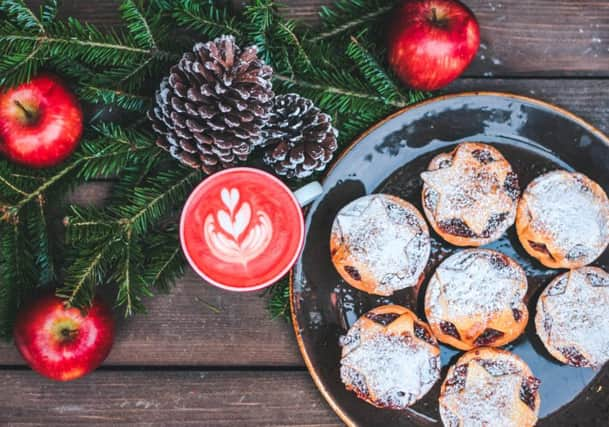From Supermarket to Plate: Ways to trim back on food waste this Christmas


It’s the season to celebrate our differences and find joy in our similarities with friends and family - and that makes it a cherished holiday in the British calendar.
But, unfortunately, with the festivities comes a whole load of waste - 60 million meals’ worth over December, in fact.
Advertisement
Hide AdAdvertisement
Hide AdThis year, Burlington Granite are helping you extend your goodwill to the environment, providing you with an assortment of ways that you can reduce your food waste.
Buy what you’ll use (and use what you buy)
A sin many of us are guilty of every year is stocking our cupboards full of food but only eating half of it. Often around Christmas, our eyes can be bigger than our stomachs - which ends up costing both the planet and our wallets if we throw food away.
What’s even better than dealing with leftovers is not having any at all, so make a plan before you’ve walked out the front door.
First things first, prepare a list - bearing in mind that the aim here isn’t to buy everything you might need but only the things you will definitely need.
Advertisement
Hide AdAdvertisement
Hide AdFor example, if you buy Brussels sprouts for your Christmas meal every year but you’re the only one who eats them, consider buying a smaller portion to save the excess from heading to the bin.
Once you’re happy with your list, browse through your cupboards. Non-perishable goods can last for years and you might just be surprised as to how much food you have sitting unused in your kitchen.
Once you have a shopping list that you’re happy with, it’s time to head to a shop. At this point, it’s important that you’re not lured in by tempting packaging and offers; stick to what you wrote down and avoid impulse buys that won’t ever be used - if you truly need something later, many supermarkets will be open up until Christmas Day.
Now that your home’s suitably stocked, it’s time for the festivities to begin. After the dust has settled, you might be left with leftovers, though hopefully these should be minimal.
Advertisement
Hide AdAdvertisement
Hide AdIf you’ve not got a compost, consider how you can use up the remaining food in the days following - whether that’s by saving some of it for New Year’s Eve nibbles or repurposing them into something new altogether.
The Scottish Government has pledged to cut the country’s food waste by an impressive third by 2025, and reusing what would otherwise be binned is an important part of this.
For ways you can do this, including recipes and more, check out the Love Food Hate Waste website.
Cut out plastic packaging
As many of us know, plastic has long been a scourge to planet Earth. From its destructive impact on sea life to its non-biodegradable nature, plastic packaging is having a considerable effect on our planet’s wellbeing - and this is only multiplied over Christmas.
Advertisement
Hide AdAdvertisement
Hide AdBesides the obvious plastic that comes with brand-new gifts, the food we buy usually comes wrapped in unnecessary layers of plastic - much of which isn’t recyclable.
Fortunately, there’s a growing collection of independent ‘zero-waste’ shops cropping up across the UK, offering unpackaged foods for guilt-free shoppers.
Unsurprisingly, as the leader in tackling food waste, many of these are located right here in Scotland. The premise of these alternative supermarkets is to ditch the plastic by asking the shoppers to bring their own reusable containers - as, this way, the food doesn’t need to be packed in plastic.
Plus, many of them stock an entirely organic range, most of which is often sourced from local farms, helping you trim back on your environmental impact even further.
Advertisement
Hide AdAdvertisement
Hide AdTo find your nearest zero-waste shop, The Zero Waster has put a handy list together.
If you’ve considered trying one of these but haven’t given it a go yet, this could be your year. Don’t be put off by misconceptions about pricing, as, in fact, shopping at these markets can sometimes be cheaper if you don’t overbuy.
Of course, it’s not always possible to buy all of your foods from these shops, so, for ingredients that require you to shop at a chain, check the label and try to pick recyclable product packaging. Glass, for example, is, by its very nature, a far more eco-friendly material than plastic.
Start composting
Even though composting offers many benefits to eco-conscious homeowners, it nonetheless remains an unpopular choice. But with new bins allowing you to compost indoors with ease, there’s no longer any excuse for wasting energy unnecessarily by throwing your leftover food into landfill.
Advertisement
Hide AdAdvertisement
Hide AdBeyond that, a compost can provide free organic fertiliser to use on your outdoor areas. Whether you’re a green-fingered tomato grower or a novice at gardening, making your own fertiliser from leftover foods will drastically reduce your impact this Christmas - so consider using a compost.
Think organic
If you’re thinking about low-impact food for Christmas, cutting back on plastic isn’t the only thing to consider.
‘Organic’ is an established buzzword in environmental circles - and for good reason. This all-natural method of food production is dramatically less harmful than other farming methods, thanks to the lack of pesticides and other nasty chemicals used on the crops.
Ordinarily, these chemicals would contaminate nearby soil and water - organic farming, however, avoids this altogether.